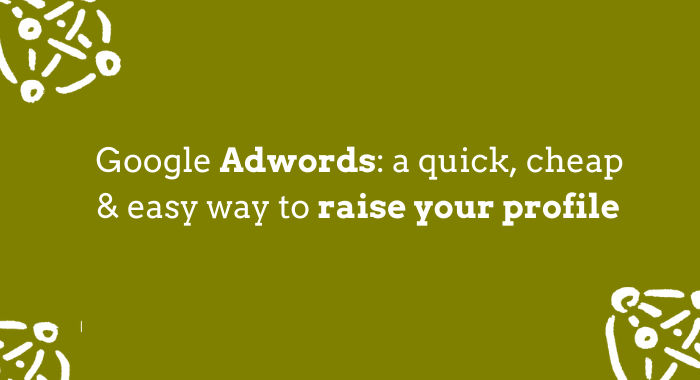Google Adwords to raise the profile of your business

I very rarely recommend paying for advertising. It's worth getting every other aspect of your marketing right before you start paying for ad space, particularly as it's so hard to judge how effective it is. But sometimes you need results quickly.
Google Adwords is different to traditional advertising. It's a really useful and cost-effective tool, whether you want to raise your profile or attract some last-minute bookings.
Most advertising costs a lot, and you won't have a clue whether some one has seen your ad or not. Google Adwords works very differently.
I do recommend that you try to understand at least the basics of search engine optimisation and make sure your site is performing well before you start to spend money on Google AdWords. But if you need quick results, AdWords can help. You can set it up with just a few pounds, and don’t need any technical knowledge.
Here’s what I like about Google AdWords:
You don’t need a big budget – even £10 will help you decide if it’s worth further commitment
You don’t need to pay anyone else (such as a designer) to set up your ads
You won’t pay a penny for many people to see you ad! You only pay when someone clicks through to your website, so you can monitor the effectiveness of your ads much more easily. With traditional advertising, you pay large sums of money without knowing who will see your ads, when or what they will do when they see them. With AdWords you pay per click (PPC) – when someone clicks the ad and is sent to your site.
AdWords is very flexible – you can change the details of your mini campaign very easily (a little like when you boost a post on facebook). You can experiment, by simply changing the words you use or adapting your budget.
Traditional advertising places ads where there’s a possibility someone might see the ad and be interested in what you do. Google AdWords shows the ad when someone is highly likely to be interested in what you do – showing intent to buy.
How Google AdWords works
When someone types in some key words e.g. ‘outdoor activities in the Yorkshire Dales’, they show the ‘natural’ or ‘organic’ search results (affected by search engine rankings) as well as paid ads. The paid ads you see depend on the key words you’ve typed in.
AdWords lets you choose the words you want to ‘bid on’. So if you have chosen the words ‘outdoor activities in the Yorkshire Dales’ for your Google Adwords campaign, there is a good chance your ad will be seen. The likelihood of your ad being seen when someone types in those words, depends on how much you’ve bid. If you bid 10p for the term, your ad might be shown every five times someone types those key words. If you bid 50p it might be shown every time.
If you choose highly specific terms there’s a stronger likelihood your ad will be shown, even if you bid a low amount. This can take a little skill to get right, but Google has plenty of tools and online advice to help. It costs very little to experiment, and the system is really logical.
Bear in mind that although Google maximises revenue by getting people to bid (it’s all done online and is simpler than it sounds) on popular keywords, it also has a quality score. If many users go to your website and then leave it almost immediately (giving you a high ‘bounce rate’), then they might give less priority to your ads. Conversely, if your website is good – your ad may be shown more frequently despite paying a low bid price.
Google can give you access to free tools like the Keyword Planner that help you to discover which words might be most powerful for your type of business. You can then use this knowhow to help improve your search engine rankings as well.
Advice to help you get started
1. Set a budget – it could be as little as £20.
2. Keep things simple – experiment, but don’t create lots of different ads at once. Use one, refine it, then keep refining it.
3. Use the tools Google provides to check what works.
4. Think carefully about the best times to advertise and especially carefully about the best words to bid on.
5. Think what you’re trying to achieve: it could be bookings or sign-ups to your newsletter. Write your ad to focus on that.
Interested? Just go to Google Adwords


0 comments
Leave a comment